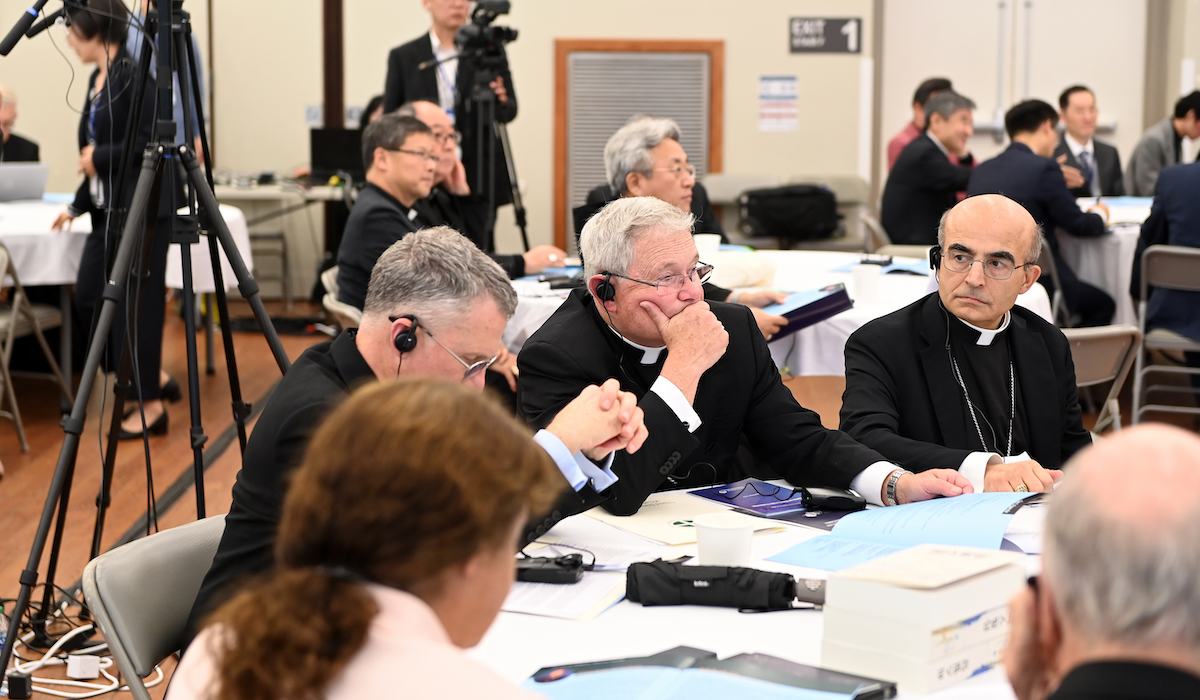

An international gathering of Catholic bishops, government officials and foreign policy experts from South Korea, Japan and the United States assembled at Catholic University last week to discuss the role of faith-based initiatives in promoting peace as North Korea launches ever-more advanced ballistic missiles and threatens more nuclear weapons tests.
Ambassador of the Republic of Korea to the United States Tae-Yong Cho said during his opening remarks that the 2022 Catholic Korea Peace Forum is an important continuation of the Church’s role promoting peace on the peninsula through prayer and action.
“The Korean people salute his holiness Pope Francis who has expressed his intention to help promote peace on the Korean peninsula … an objective that requires such solidarity,” he said. “If we continue to walk together … I am certain that we will find ways for denuclearization and peace.”
The Korean War began over 70 years ago but is technically ongoing as a peace treaty was never signed. North Korea has a nuclear weapons program while South Korea is building its own non-nuclear ballistic missile capabilities. Amid the hostile relations between the divided nations and the ongoing tensions between the U.S. and China, insecurity looms over the Korean peninsula, said Bishop Simon Ju-Young Kim of the Diocese of Chuncheon in South Korea.
The Catholic Institute of Northeast Asia Peace (CINAP), has hosted annual international peace conferences since 2017 to carry out the Catholic Church’s calling to build peace. Maryann Cusimano Love, associate professor of international relations, attended the 2018 CINAP conference in South Korea and was instrumental in arranging for this year’s peace forum to be held at the University. The United States Conference of Catholic Bishops (USCCB) Committee on International Justice and Peace and the Catholic Bishops’ Conference of Korea’s Committee for the Reconciliation of the Korean People (CRKP) were co-sponsors for this year’s forum.
Archbishop Christophe Pierre, apostolic nuncio to the United States, said the canonization of the 19th century Korean martyrs and their inclusion in the Church calendar recognizes the Korean people’s place in the heart of the Church. “The Holy See has a lively interest in the good of the peoples of Korea,” he said. “May all of us gathered here for this conference … dedicate these days to peace.”
There is also an ongoing effort to beatify Catholics killed by the North Korean communists during the Korean War, including a bishop and more than 1,000 Christians. The Catholic Church in North Korea is sometimes called “the Silent Church” as public worship is tightly restricted to one state-run church that has no ties to the Holy See. There are no resident priests in North Korea but the South Korean Catholic Church has been permitted to send priests for major holy days since 2015.
Most Reverend Peter Lee Ki-heon, bishop of Uijeongbu in South Korea, said an estimated 3,000 Catholics in North Korea keep their faith through personal prayers and devotions.
Most Reverend Simon Ju-Young Kim, bishop of Chuncheon in South Korea, said the Committee for the Reconciliation of the Korean People, of which he is a member, has been praying and working for peace and reconciliation. “Because we, the Church, believe and preach that ‘true peace is made possible only through forgiveness and reconciliation.’”
Archbishop of U.S Military Services Timothy Broglio, who has been to South Korea on several occasions, said, “As Catholics, we believe that any such efforts to make peace can only be of lasting effect through the power of prayer. This is a weapon of hope, not a sentimental afterthought.”
The second day of the conference experts from Korea, Japan and the U.S. discussed ways to bridge divisions. These discussions were closed to the public but livestreamed.
Professor of Politics and Director of Asian Studies Andrew Yeo who attended the discussions, said peace will not come until their political leaders commit to dialogue.
“None of that is happening right now, in part because … North Korea is not interested in dialogue; in part because the U.S. is busy with other problems; and also because of the pandemic lockdown that’s still in place in North Korea. There needs to be some kind of meaningful engagement that moves forward to make advances in peace on the Korean peninsula,” said Yeo.